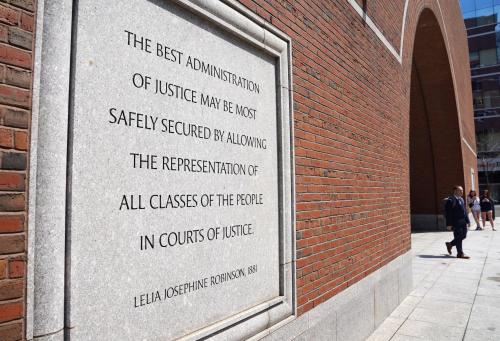The Trump administration has taken unprecedented steps to reshape the federal role in education—expanding some functions to closely monitor local education practices (e.g., teaching about systemic racism or privilege) while shrinking others (e.g., the federal capacity to enforce disability law in public schools). The consequences have been significant. The department has canceled funding for teacher training programs and education research, paused civil rights enforcement related to racial and disability-based discrimination, and failed to release congressionally mandated reports. This has unfolded amid broader efforts to dismantle the U.S. Department of Education (ED), with nearly half of the relatively small agency’s staff having been laid off since January.
These measures have largely been carried out through a series of executive actions—nearly all of which have been subsequently challenged in federal court. A wide variety of groups are suing the Trump administration. That includes civil rights groups, both national teachers’ unions, associations representing higher education professionals and education researchers, parent advocacy groups, states, and school boards. In many cases, the Trump administration has been temporarily prevented by federal courts from carrying out the plans outlined in these executive actions.
This dynamic federal policy landscape creates a uniquely challenging context for education leaders and administrators across the country. Basic questions like: “What are the Trump administration’s directives for K-12 public schools? How have those actions affected K-12 education systems? Have the federal courts weighed in on the issue?” are difficult to answer, especially in a media environment characterized by misinformation and disinformation, and with a presidential administration that has repeatedly come under scrutiny for how it represented its authority under the law.
To address this challenge, we have developed a data tool to track the various lawsuits challenging the Trump administration’s executive actions that impact K-12 education. (A longer summary and analysis of the administration’s K-12-related executive actions is presented in an accompanying blog post.) We focus on K-12 education for clarity, given notable differences in the administration’s strategies to reshape K-12 versus higher education. The data table provides up-to-date information (updated monthly) about the evolving federal role in K-12 education and where the executive has been restricted from acting by the courts.
We are specifically tracking legal challenges to the following actions taken by the Trump administration, Secretary of Education Linda McMahon, and ED:
- Executive Order 14151, which aims to end all diversity, equity, and inclusion (DEI), diversity, equity, inclusion, and access (DEIA), and environmental justice programs and support across the federal government
- Executive Order 14190, which calls for eliminating federal funding for schools and other education programs that promote DEI or teach about racism, bias, and/or gender ideology, among other listed topics
- Executive Order 14242, which calls for the dismantling of ED and was announced soon after a reduction-in-force announcement that led to the termination of nearly half of ED’s staff
- Feb. 14 Dear Colleague Letter and subsequent actions (including state certification requirements), which declared DEI and any other race-conscious program or policy illegal under federal civil rights law
- Executive Order 14280, which declared that any race-conscious efforts to remedy racial disparities in school discipline are a violation of federal civil rights law.
While we focus on the executive actions that have been central to the Trump administration’s K-12 education agenda, it is important to note that other executive actions also have implications for K-12 public education systems. This includes, as one example, the administration’s rescission of long-standing policy to limit immigration enforcement at sensitive locations, including schools. For information on the broader range of legal challenges to the administration’s executive actions, see Lawfare’s Trump Administration Litigation Tracker.
The Brookings Institution is committed to quality, independence, and impact.
We are supported by a diverse array of funders. In line with our values and policies, each Brookings publication represents the sole views of its author(s).








Commentary
Introducing the Trump K-12 education litigation tracker
September 8, 2025